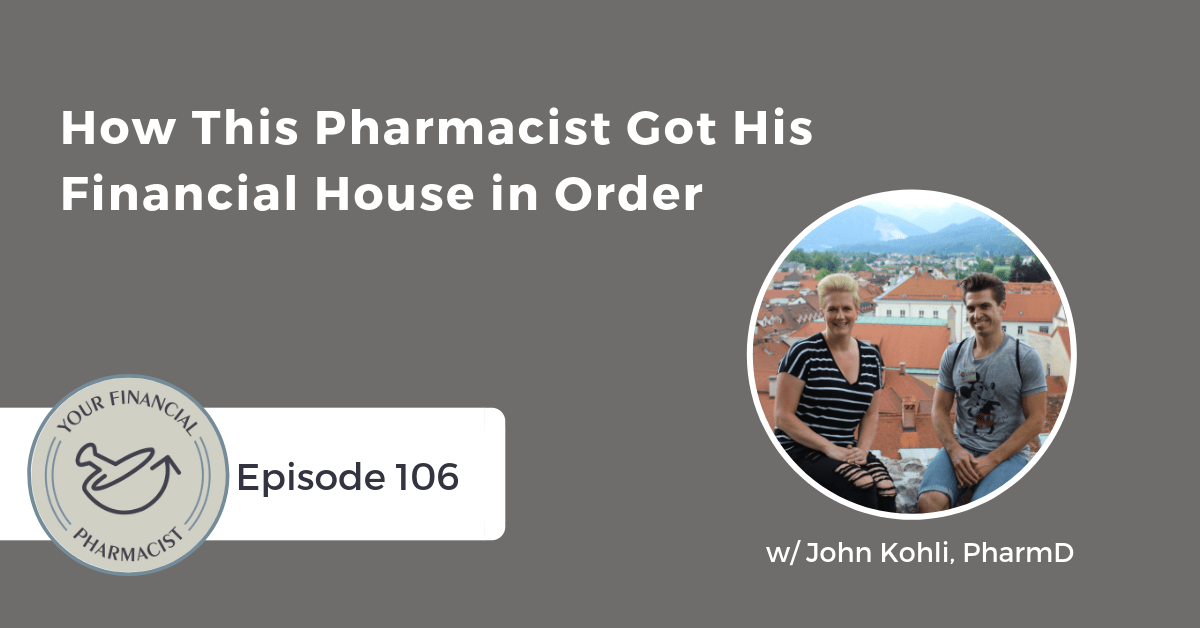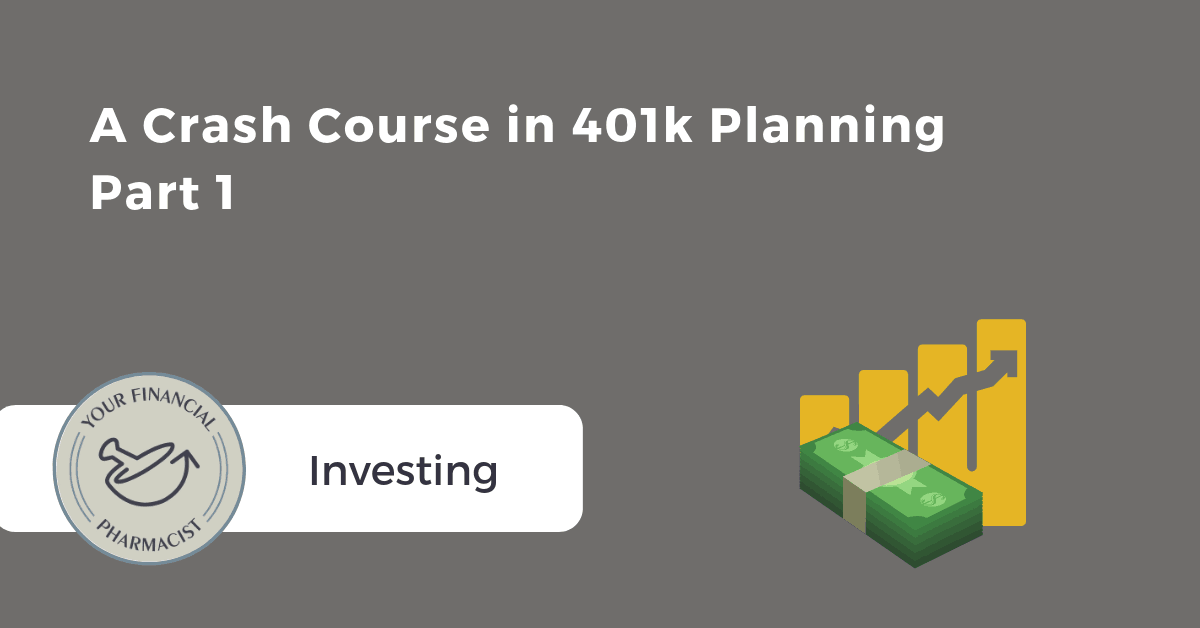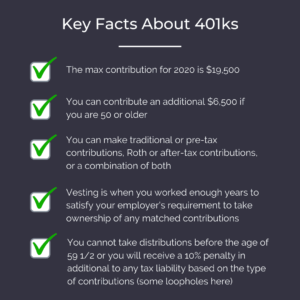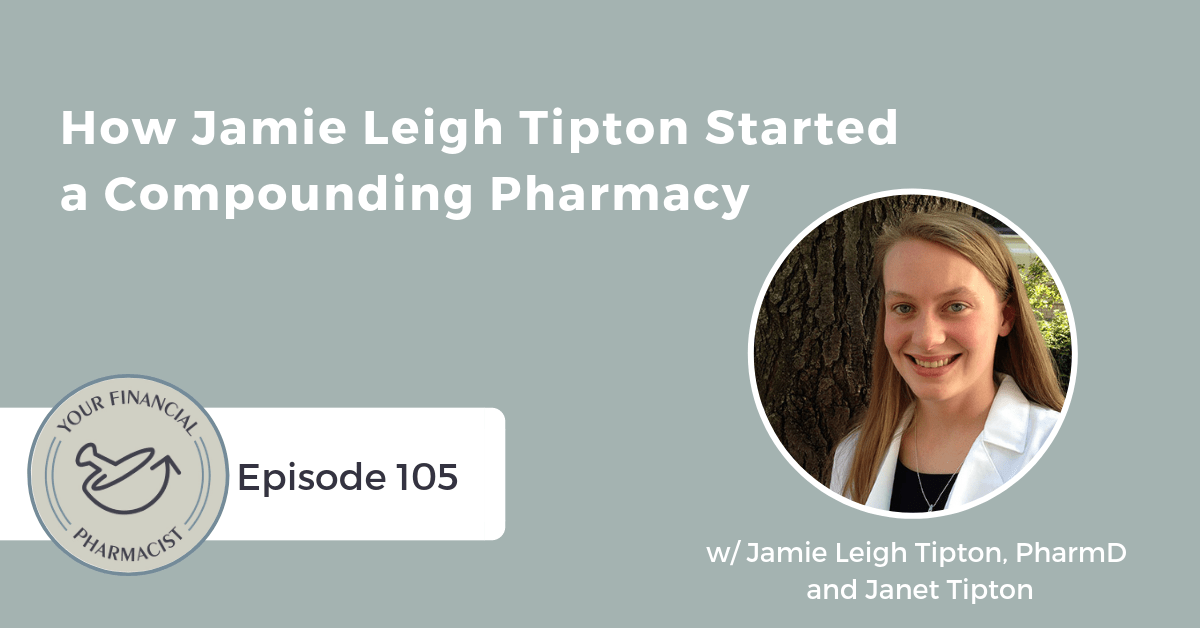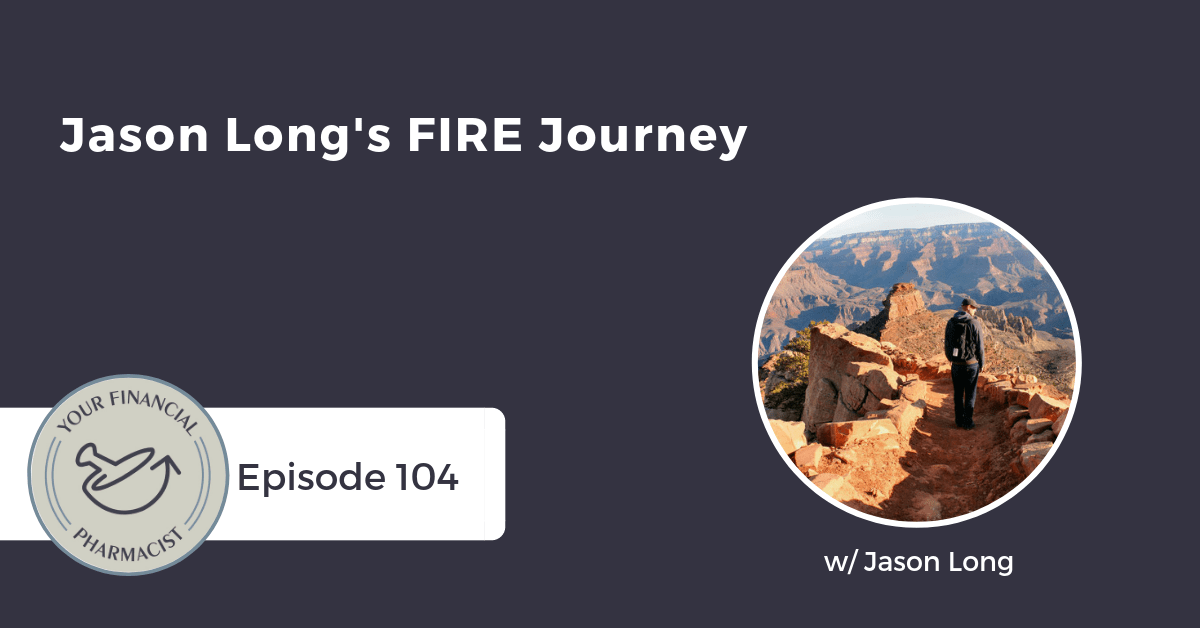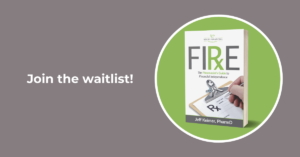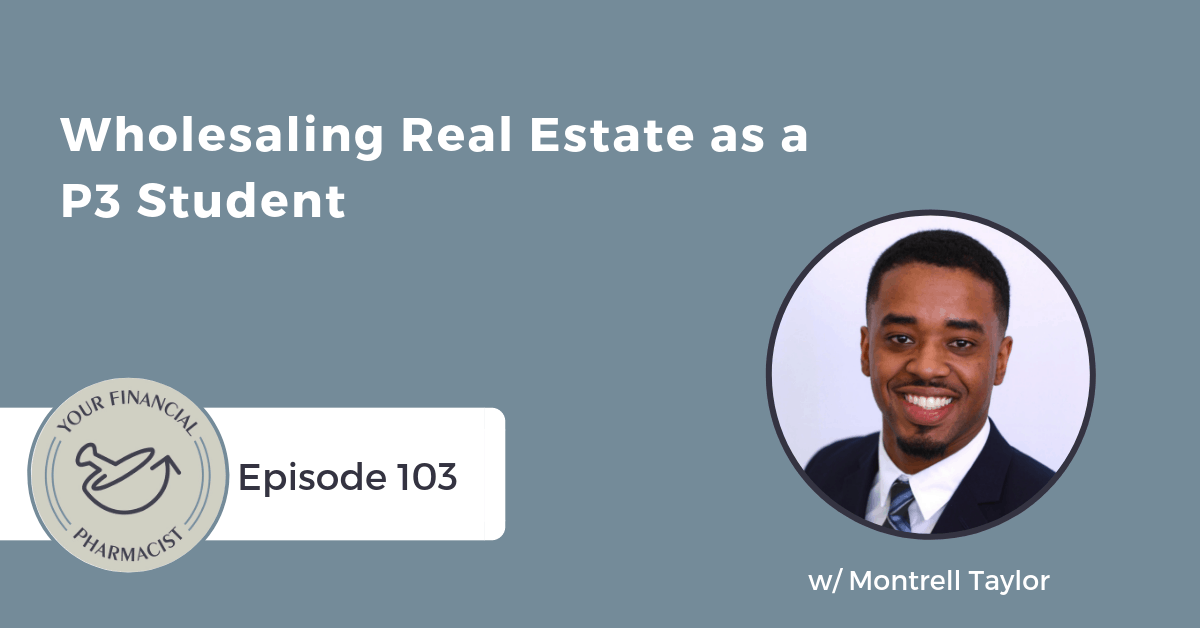How To Get Your Finances in Order as a Pharmacist
John Kohli, PharmD, joins Tim Ulbrich to talk about his career journey, how he managed to rack up approximately $260,000 of debt despite graduating from pharmacy school with minimal student loan debt, what motivated him to get his financial house in order, and how he hustled to pay off most of this debt within a 2 year period.
About Today’s Guest
Originally from northeast Ohio, John Kohli currently lives in Phoenix, Arizona and works as a pharmacist in acute care and behavioral health. John graduated with a Doctor of Pharmacy degree in 2006 from Ohio Northern University. He moved to Arizona where he completed a pharmacy practice residency with emphasis in community pharmacy with Midwestern University College of Pharmacy Glendale. He has worked for independent pharmacies, larger retail pharmacies, and hospitals. His interests include bicycling, speaking German, and volunteering.
Summary
John Kohli has an incredible story to share that includes ups and downs financially and personally and a journey of discovering his true identity and how that impacted his finances. In this podcast, John speaks about how to get your finances in order as a pharmacist.
John, a 2006 graduate of Ohio Northern University, currently works as a PRN pharmacist at a psychiatric hospital. His pharmacist journey started his senior year of high school. He worked at a small independent pharmacy and the pharmacist there encouraged him to apply to Ohio Northern. John was able to graduate with only $60,000 to $70,000 of student loan debt. He received scholarships, worked during the summer full-time and also worked 10 to 20 hours a week during school to help reduce the amount of money he had to borrow. After graduation, he wanted to move to a place with warmer weather and landed a residency in Phoenix. He still lives in Phoenix today.
Although he graduated with minimal debt compared to other pharmacists, John began racking up a lot of debt quickly. After residency, he began earning his first pharmacist salary, thought money wouldn’t be an issue and bought a house in the summer of 2006. By the fall of 2007, the stock market crashed and the housing market in Phoenix was hit hard. He purchased his house for $233,000 with an interest only loan and adjustable rate mortgage. At this time, John was working part-time due to reducing his hours to handle the addiction he was struggling with. He realized he needed to get out of that mortgage and had to short sell his house for $72,000, which affected his credit. He accumulated credit card debt during this time, as well.
John refers to a period of his life as a spiritual financial breakdown. He liked his pharmacy career, but realized he put too much emphasis on his identify as a pharmacist. In recognizing his addiction, he had to acknowledge that there was something missing and that working as a pharmacist could allow him to have a life and find out what was missing, while not focusing on his work as the only goal.
After this process of discovery and reflection, John got serious about paying off the $260,000 of debt that he had accumulated post-graduation which included a second house mortgage, credit card debt, and student loan debt. He had been gradually paying on this debt, but got serious about paying it off between January 2017 to January 2019. To do this, he worked on budgeting to take control of his expenses and started saving 70-90% of his income. John built an emergency fund ($10,000 that grew to $50,000), contributed to retirement (not in a 401k, but in a Roth and stocks but then contributed to a 401k once he got a full-time job again), and rented and had a roommate. He purchased his second home once he was able to save 20% for it. When he got serious about paying off his debt, he got rid of his credit card and paid it off, paid off his student loans and then paid off his second mortgage. He picked up another job and worked a lot and also slashed his budget in some obscure ways, like not using air conditioning even in the hot Phoenix summer.
Now that John’s debt is paid off, he feels like he has options, feels serene, and can handle what comes at him spiritually, mentally and financially. Even though it was really hard and he doubted that he’d be able to pay everything off when he was in the trenches of it, he now sees how it was worth it. Although John isn’t planning on being as dramatic as he was when he was paying off his debt, he still saves 70% to 90% of his income and lives frugally. In the future, he wants to buy some sort of asset like real estate or a business.
Mentioned on the Show
Episode Transcript
Tim Ulbrich: Hey, what’s up, everybody? Welcome to this week’s episode of the Your Financial Pharmacist podcast. I’m excited to welcome John Kohli onto the show, a 2006 graduate of Ohio Northern University who has an incredible journey to share with our listeners that includes ups and downs financially and personally and a journey of discovering his true identity and how that has impacted his finances. John, welcome to the show!
John Kohli: Thanks, Tim. Glad to be here.
Tim Ulbrich: I appreciate your time. You know, here we are, Memorial Day weekend, 8 a.m. Eastern, 6 a.m. out in Arizona, so — actually 5 a.m., right? Out in Arizona?
John Kohli: Yeah, that’s correct. Yes. Bright and early.
Tim Ulbrich: Early morning, and I appreciate you taking the time to talk with me and share your story with our listeners. I think, as I mentioned, incredible journey that I know has been inspirational to me and I’m sure will be the same for our listeners. So let’s start with your education and training. Tell me a little bit about how you got into pharmacy and then your career path since graduating from Ohio Northern in 2006.
John Kohli: Well, absolutely. I was working in a pharmacy as a senior in high school, actually. A small, independently owned pharmacy in the small town where I grew up, and the pharmacist encouraged me to apply to her alma mater, which was and is Ohio Northern. And I decided this would be a great career choice. I packed my bags, moved to Ada, and spent the six years there. And after that was looking at maybe I should move to a warmer place in winter. And I really liked the Southwest, so I found a residency out in Phoenix and decided to pack up my Honda Accord and drive on over to Phoenix, do a residency, and plans were to stay for a little bit and see how things went. And here I am, almost — what? — now 13 years later.
Tim Ulbrich: Yeah.
John Kohli: Still here.
Tim Ulbrich: So growing up in northeast Ohio, as I recall, correct?
John Kohli: That’s correct.
Tim Ulbrich: So no wonder. I grew up in Buffalo. So no wonder you wanted to move out to Arizona. I mean, you spent time in northeast Ohio, you spent time in Ada, Ohio, where the winds and the polar vortexes are readily there. So going out to the warmer weather certainly makes sense. So talk us through, you got to Arizona, you do residency with a compounding pharmacy at Midwestern University. Tell us then about the career path that leads up to your current role at the psychiatric hospital.
John Kohli: It’s interesting. I’m glad that I did the residency out here in Arizona because I didn’t know anybody but a friend of a friend from Ohio Northern, who was also a student at Midwestern. So I came out here blind in terms of any friends or connections other than my job and that one loose connection. And I ended up starting to be an assistant professor at Midwestern and also working still at that compounding pharmacy. And that is where my journey continued. And I met a lot of people through the state association, through residency. We had some residents groups. And then I ended up leaving the college and just working full-time at the compounding pharmacy, although this specific one was more in terms of HIV specializing. So we helped patients there at that clinic. So it was about at that time that I really had what I call my spiritual and financial breakdown. And my problems with addiction really came into play. And I had to take about a year to sort of take some time off from pharmacy and just work part-time. I worked in a grocery store setting in another small, compounding pharmacy for a year or two, then bounced into a clinical pharmacy position with the prisons for a very brief moment and then back into the grocery store. So at that time, it was figuring out, is this the right career for me? What do I want to do with my life? A lot of the financial realities were starting to hit there. So there was a lot of questions about what am I doing? And it was during that time that I landed the director position at a psych hospital. And from there, spent about 3-4 years in that position. Also got into a PRN position at an acute care-trauma hospital and really built those connections in that aspect of pharmacy. And that’s where I am today now.
Tim Ulbrich: And so before we get into, you know, what you referenced as your spiritual/financial breakdown, knowing that’s such a big part of your story, I want to talk about your strategy and debt position coming out of pharmacy school because you really had a lower amount of student loan debt, significantly lower, than is the average. So I’ve talked before with our listeners, also went to Ohio Northern University, because of my lack of education and awareness and different factors, I came out with a little more than $200,000 of debt during my repayment journey. But you had a much lower amount, $60,000-70,000, which is about $100,000 less than the national average right now. So how were you able to graduate with the lower amount of debt than is the norm, especially coming out of a private institution?
John Kohli: You know, Ohio Northern blessed me with some scholarship. So I already came in with some academic scholarship and also, through — there was an organization in the nearby small town, and they also helped with a portion of my student loan, or student tuition, excuse me.
Tim Ulbrich: Sure.
John Kohli: And then I basically worked throughout my years at Ohio Northern. I worked during the summer full-time and worked during the school year 10-20 hours a week from really freshman year until I graduated. So — and I paid some of that tuition and tried to minimize the amount of loan debt I had to incur.
Tim Ulbrich: So minimizing the amount that you needed to borrow for cost of living and other things, scholarships, it sounds like from that, as well as the work experience. I’m just curious, Ada, as everybody knows — for those that don’t know, it’s literally in the middle of nowhere — so I get the summer work, you know, you probably went home to northeast Ohio. Where were you working like throughout the year? Like there’s one pharmacy I think within 10 miles.
John Kohli: Yes. Well, I had to drive the 10 or so miles to Lima, Ohio.
Tim Ulbrich: OK.
John Kohli: And luckily, I met an alumnus in the Rite Aid corporation, and from — I’d done some college work as a senior in high school, and I was able to get my intern license the winter of my sophomore year.
Tim Ulbrich: OK.
John Kohli: So actually in December of that year, I started interning at Rite Aid in Lima, Ohio, and would drive there on the weekends, sometimes during the week, but almost every weekend. Sometimes I wished that I could be hanging out and enjoying the weekends off, but there was a lot of times I had to go into work.
Tim Ulbrich: A lot of hustle. And we’re going to come back to that because that’s very much your journey of paying off debt was a lot of hard work and hustle. You’re giving me flashbacks, John. I remember sitting in the chapel at Ohio Northern in our Profession of Pharmacy POP course winter semester of the P2 year, applying for intern licenses. So I was back on campus recently talking with our students, and I was like, you know, we had POP, Profession of Pharmacy in the chapel. And they looked at me like I was crazy because now they have like these nice facilities and buildings and all that. So good times and memories. So you know, let’s talk about what happened. I mean, we’re going to talk in a minute about paying off $260,000 of debt, which was a variety of things, student loans, a mortgage, some credit card debt. But what happened from graduating in such a good financial position to really, in some sense, the wheels falling off and racking up a significant amount of debt after graduation? Where did that debt come from? And why was that the case?
John Kohli: Well, the biggest thing that happened was after I finished my residency and got that first real pharmacist salary, and I felt like I was rolling in dough. I mean, this is what I wanted — this is why I went to school for six years and an extra year. And I bought a house here in Phoenix in the summer of 2006. And if anybody can remember, yes, yes. You know exactly where I’m going with this.
Tim Ulbrich: Yeah.
John Kohli: Is by 2007, the fall of 2007, the stock market crashed, and the housing market just tanked here in Phoenix. So I bought with an interest-only loan. I didn’t put any money down, and I bought at the top, tip-top of the market. And that was a significant — that was over $200,000 of debt right there in that property. And this was at the time when I had to start working part-time and wasn’t full-time employed. So it was OK when times were good. I could pay that mortgage. But as soon as something unexpected happened and I didn’t have that income and the market wasn’t great, I was in a bind. And that’s where I also racked up credit card debt and was just not able, you know, would have been able to pay the mortgage but also, it was a burden.
Tim Ulbrich: So it sounds like several factors came together that, you know, the part-time work since you’re not working full-time, you mentioned interest-only loan, no money down, and all of a sudden, the market takes a significant hit. And so you don’t have that full-time income. Obviously, you have some student loan debt. But that leads then, I’m assuming, to some credit card debt because of a lesser salary and the mortgage challenges that are going on. So give me the details on the home. I mean, obviously what I know of Arizona and the financial crisis with the mortgage bubble being popped is they were hit probably harder than anybody else. I mean, maybe a couple other markets, but what did that actually look like number-wise for you? And how did that impact the rest of your plan?
John Kohli: Oh yes. So I bought in 2006, $233,000 as an interest-only, adjustable rate mortgage after a 10-year arm I think is what it was. And ended up short selling that house in 2012 for about $72,000.
Tim Ulbrich: Wow.
John Kohli: So that is how bad it was here.
Tim Ulbrich: Wow.
John Kohli: And even after I sold, that definitely affected my credit and ability to purchase something else. So I was looking at trying to find something for cash, and you could find, in those 2012-2013, you could find condos here in Phoenix, you know, nice 2-bedroom, 2-bath condos for under $50,000. So I was looking to pay cash for something. But I kept getting under contract and losing it or there was bidding wars. And then the market just was out of my reach in terms of paying cash after that. And it was, you know — now, we’re back up to where we were prior to the crash or the recession or even higher than where we were.
Tim Ulbrich: You know, it’s really interesting just to hear you say, John, in such a short period of time, you went from graduation, feeling like you’re rolling in the door, six-figure income to all of a sudden, what was I would argue a very good position, only $60,000-70,000 of student loan debt quickly turns into a lot of debt because of the mortgage position, credit card debt, you mentioned the car loan, of course the student loan debt didn’t go away. I think there’s something to be learned for all of us there in terms especially when you’re looking at those big purchases like a home, here we are again, right, 2019, super hot market here in Columbus. I think it’s the No. 1 market in the country right now. And I think it’s easy to buy these homes, the doctor loans are readily available, nothing down, arms, all those types of things, interest-only options, and for some people, they may be able to get away with that. Maybe the market doesn’t crash next year, maybe it does, but really looking holistically at the rest of your financial plan to say, hey, if the market goes down 20% next year or 30% or 40%, what’s my game plan, right? As I look at the rest of the plan, and I think that gets into a bias where we tend to look at things through the lens of today.
John Kohli: Yes.
Tim Ulbrich: Assuming they’re always going to stay the way that they are today.
John Kohli: Yeah, everything looks great.
Tim Ulbrich: Everything looks great.
John Kohli: Like you said, what happens if the market crashes? Or what happens if I lose my job? Or some other unexpected thing happens? What do we do?
Tim Ulbrich: Yeah, you never know. That’s exactly right. You never know what that may be. So I’m assuming — I want to come back to you mentioned previously having a spiritual/financial breakdown. And I have to assume all of this was going on at the same time when I just see the transition from where things started to where things ended up and then obviously, we’ll talk about the recovery of that on the back end. So tell me more about this spiritual/financial breakdown, as much as you’re willing to share about where that came from and then how that played a part in eventually you turning this ship around.
John Kohli: Yeah. You know, I just realized that I had really liked my career and I liked pharmacy, but I think I was just putting too much emphasis on the career, you know, the career being my identity. Like it wasn’t just I’m John, who is a pharmacist. It was, I’m John the pharmacist. And everything I did was based on this job and also in the fact that I also wanted to make money. And that was the end of the goal. That was really it was just in, you know, pursuing this goal of getting that degree or getting that salary. And once it happened, there really wasn’t anything — it wasn’t that fulfilling. It was, OK, now I’m done with it. And what do I do now? And I think that in really recognizing my addiction, I had to say, there’s something missing here. And I need to find out what that is. And I think, you know, pharmacy could allow me to have a life to find out what that is but not be the end and only goal.
Tim Ulbrich: So much wisdom there. And I hope our listeners hear that because I think that’s true for many pharmacists, addiction aside, is the identity that can come from career. Something I struggle with on a regular basis, and I think it’s something that just constantly I’m hoping to challenge others to say, hey, at the end of all this, what’s the point? Why does this matter? As you look back in 30 or 40 years, like, what is this really about? And I like what you said about career is certainly a big part of the overall picture, but I think if that becomes the sole identity, there’s going to be a lot of disappointment for lots of different reasons. So where did that discovery process for you come from? Was that a part of you working through the addiction? You mentioned a spiritual component there. Where did you really pivot and say, OK, if it’s not this is my true identity, this is what is my true identity. Where did you get the freedom to discover that?
John Kohli: It’s been from just spiritual work. You know, in looking at the things in my life that I’ve done, you know, my character assets, my character liabilities, basically forgiving myself for the mistakes I’ve made and then also recognizing that I can have choices, and I can choose what I want to do and my actions have consequences, either positive or negative. So it really got — basically, seeing everything crash down around me and recognizing that I’m still here, I’m OK, and I’ve got a responsibility to take care of these things, but now I can deliberately make choices to basically put myself into a better option in the future. And that that is my responsibility, and I can use that through my relationship with God, through other ways — not just through my job but through other things, you know, through my church, through community organizations and my hobbies and interests, that it needs to all come together.
Tim Ulbrich: So let me build on that. And one of the things I often think about — probably too much, to be honest with you — is that I often think and try to picture a scenario where I’m 75-80 years old if I’m lucky enough to have the opportunity to live that long, my kids are grown and they’re off, and my wife and I are reflecting back on life, and I try to think from those moments, from that moment, like as you look back, I try to think about what are the things that would need to happen that I would say, “Life well lived,” and I would have peace with that. And I often worry and am somewhat anxious that I’m going to look back at that and say, “Wow, I spent a whole lot of time doing a whole lot of things that didn’t really matter a whole lot in the scheme of this bigger picture.” So for you, John, as you think about that scenario, what are the things that you want to look back on when you’re 75-80 years old and say, “I’m so glad I did this or I spent my time doing this.” What are those things that are most important?
John Kohli: I think for me, it’s helping my family, you know, my parents. I want to make sure that they’re retirement and the rest of their life is taken care of. I want to help my brother and sister. And then I want to help friends and other people that are in addiction. I want to be able to show them that there’s a way out. And I think that, you know, as much as money is great and having great experiences, traveling and accomplishment, those are all great things, but I really think it’s that relationships with the people that you love and other just people in general are going to be the most important things that I look back on.
Tim Ulbrich: You know, one of the other things I just thought of, John, is that the data would show that there’s several people that are going to be listening to this podcast that may be struggling with some type of an addiction. Obviously, that can be in a variety of different things. And while there’s not necessarily data to show this, I would argue there’s many that are listening that are struggling with identity solely being tied up in career. If somebody is listening today and one of those two things resonates, what words of wisdom would you have for them?
John Kohli: Well, if it’s addiction, there’s many organizations to help with that. And you know, I would encourage looking into those types of areas. And if it’s identity, you’re really reflecting. And if you can take some time off, maybe, you know even if it’s a couple days, if you are blessed with being able to take a couple weeks, to just look at what do you want? And find out what do you want? I’ve always had a bucket list of things that I wanted to do, from — basically from college. It was 100 things. List 100 things that you want to accomplish before you die because you’ve got to start doing it now. And you know, maybe that’s one way to start, to say what are some important things that you want to get done? And writing them down, and then taking a couple to start. And see what you need to do to do those things because that’s what I’m realizing is that life is short. I am in my late 30s, but I feel that — I still have a lot of time, but it’s not an endless amount of time.
Tim Ulbrich: Yeah, and I love your suggestion there of just taking time to stop and reflect, right? It’s just so easy when life gets so busy to run week to week, month to month, year to year. And as I’m sure you do, we’re still relatively, I guess, new graduates. I graduated in 2008. So 11 years ago, but I look back at that 11 years and I’m like, what the heck happened? Like that went extremely quick. And if you’re not intentional about it, it can fly by. And I think often, that can turn into a career without intention. So let’s talk about the practicalities of how you did it, how you paid off $260,000 of debt, which was a combination of student loans, a second house mortgage after the first experience you had, some credit card debt. And while this was of course over a period of time, I know that you did most of this between January 2017 and January 2019. So that’s a lot of money in a very short period of time. So talk us through how you did it, how you wrapped your arms around this incredible amount of debt, and what did this look like month by month for you to begin to knock this down and ultimately get it paid off?
John Kohli: Absolutely. It’s hard to think — when you say that number, I’m like, wow, was it really that much? But I guess it was. And really, it definitely felt when I was hustling the hardest, you know, I kept praying, I was like, “God, if this is the right thing for me to be doing,” — because I was spending so many hours at work that I was like, “If this isn’t, please stop it.” I was willing to do what it took and to be very intense in getting there. But at the same time, I kept asking and pausing to say, “If this isn’t right, show me the way to do it.” But I guess it must have been right because here I am. And so I short-sold that house. And I was working and saving money. I started budgeting after that short sale, and I started actually looking at my finances. I think that was the first and foremost thing was actually knowing where my money was going and being deliberate about it, writing it out. And that allowed me to save some money. I started with an emergency fund. I don’t remember exactly how much it was, but maybe $10,000? And then it basically grew up to about $50,000. And I was looking for a place to buy with that. But it never worked out, so I just kind of kept saving it, started saving for retirement in my own — I wasn’t in a 401k thing, so I just put some stuff in a Roth IRA and bought some stocks in a mutual fund. And then I did get the full-time job, so I did start contributing to a 401k. And then I just really kept up with budgeting, kept up with saving as much as I could, and I was saving a pretty significant percentage. I was renting, I had a roommate at certain times, so my expenses weren’t that high. But then I finally did decide to buy another property. And I put down 20%. But then I had this mortgage over my head. And that was — it stressed me out again because I felt, you know, maybe there was a little bit of PTSD from my previous experience that oh my gosh, what happens if something terrible happens? So I had that mortgage, I still had a little bit of student loan. But in 2017, January, I decided, you know what? I’m going to get intense, and I’m going to basically get rid of my credit cards — I had finally paid those off — get rid of the other student loan because I had the cash to pay for it, so I got rid of that student loan even though it was such a low interest, I’m thinking, man, I could make so much more money in the stock market, but you know what, I’m going to get rid of this debt. And then it was, I’m going to get rid of this mortgage because I don’t want to have any debt anymore. And there we go. So that’s where I picked up another job and basically just worked my tail off.
Tim Ulbrich: So no credit card debt, no student loan debt, no mortgage, no car payments. Put that into words for me. What does that feel like? I mean, what is that sense of relief and freedom that you get being in the position you’re in right now?
John Kohli: It just feels like I have options. You know, it’s the openness. I feel like — well one, I’m serene because I really do feel like I can handle whatever is thrown at me. Really, financially, I can handle whatever is thrown at me. I do feel even spiritually, I could handle whatever’s thrown at me. But here I am in this just — I feel very secure financially. And then from my kind of just a I guess mentally, I feel like I have so many options. So that is just for me, it just really does feel like freedom. It’s freedom to choose, freedom to take advantage of whatever opportunity comes up, and it just, it feels like it was worth it, even though at certain points of time during that process, I was doubting it or was unsure. But it definitely feels like it’s worth it now.
Tim Ulbrich: Yeah, and I think freedom is the exact word that I think about when I hear your journey. I mean, whether it’s freedom to take a year off to pursue something that you want, whether it’s freedom to give in a radical way for something that you’re passionate about. Options, options, options, right? And that’s really where you are right now. And I think certainly, it’s an incredible journey to hear where you started, where you went, and now where you’ve taken that into the future. So now that your debt is paid off, what is the plan? What are you doing with all of this extra money each and every month? Have you slowed down the hustle and the grind and the cutting of expenses? Or have you kept that and are you reallocating that money in other directions?
John Kohli: OK, so I definitely got pretty dramatic in my cutting of expenses during that time. I spent last summer with no air conditioning in Arizona through the summer.
Tim Ulbrich: Wow.
John Kohli: It wasn’t that much, but you know, in terms of money saved, that was the commitment level that I was willing to do. I don’t know if I’m ready to do that this year. I think I could probably spend a couple hundred dollars on the electric bill this summer just to avoid that.
Tim Ulbrich: I think you could, yeah.
John Kohli: Yeah, just to avoid the extreme nature of that. But I still do save like 70%, sometimes up to like 90%, of my income now.
Tim Ulbrich: Wow.
John Kohli: And right now, I’m putting some away in like a retirement account, but most of it is going into just my savings because I — eventually, I want to — maybe it’s a business, maybe it’s a rental property, but some other income. I want to buy some sort of asset to, you know, in the future. I don’t know exactly what that is, but I know for me, it’s having the cash readily available when that option comes up is — to me, that’s important. And still saving for retirement and having investments in index funds, you know, that is still a priority, an area that I’m focusing on. But I still am definitely extreme in my frugality. I still bike to work. I rarely go out to eat because I like cooking, and I like making things for myself. But I think this year, I’m going to probably get air conditioning.
Tim Ulbrich: So you know, it’s interesting. As I hear you talk about the journey paying off the debt but as well as right now where you’re 70%, 80%, 90% of your income, obviously that tells me you have some system in place where you’re tracking and accounting for expenses. So I’m assuming some type of a monthly budget. Can you talk us through what that looks like for you and how you manage that? If you use any tools? I think that’s a practical way that we might have somebody listening who’s going to say, “I’ve got $200,000 in debt, and I just don’t know where to start. I don’t know what to do here.” So what does that look like for you on a month-to-month basis?
John Kohli: You know, I have a — in my Notes on my phone, I have a discretionary budget, just in my Notes. And I set aside a certain amount of money, and then whenever I spend it, I document it in my Notes section. And then at the end of the month, I tally all of that up and make sure that it works — what that dollar figure is works with what has been coming in in terms of my income. And because I work sporadically, you know, some paychecks are much higher than other paychecks. But I have an idea of what the income that’s coming in is going to be. So as long as I’m keeping an eye on whatever’s coming in and what’s going out, you know, at the end of the month, they reconcile. And I reconcile it. And I just always use cash if I can. I take a certain amount out of the bank, and that’s what I use to buy things at the grocery store or whatever else I spend. I don’t have credit cards, so if my bank account doesn’t have the money in it, it’s not going to get — I can’t buy it, essentially.
Tim Ulbrich: So that’s a great example, you know, there’s a lot of varieties of budgets. We talk about a zero-based budget a lot on this podcast and on the blog and on the website. But what I’m hearing you say here is you essentially allocate x dollars per month for the discretionary, nice to have, expenses, and you make sure you don’t overspend that, but everything else, you’re allocating towards savings goals or maybe it’s giving or other types of goals. But you’re trying to identify a certain percentage that you’re just not going to overspend and then knowing that —
John Kohli: Exactly.
Tim Ulbrich: OK, very cool. Yeah, I think that’s a good way of doing it. And I think the message there hopefully for our listeners is, you know, there’s not only one way to do budgeting. And I think finding a system and a process that works well for you to allow you to be on the path toward achieving your goals is really what is important. So John, I want to again thank you for coming on the show, for your willingness to share your story. I look forward to following your journey in terms of what you’re going to do going forward, the impact you’re going to have on the pharmacy community, the impact that you’re going to have on those that struggle with addiction or career identity, whether you’re going to eventually invest in a business or real estate, other things. I think the future is really, really bright. And I look forward to following that journey and hopefully collaborating with you on some level going forward. And I thank you again for your time in coming onto the Your Financial Pharmacist podcast.
John Kohli: You’re welcome, Tim. It’s been a pleasure, and I thoroughly enjoyed it.
Recent Posts
[pt_view id=”f651872qnv”]

